Healing a mother’s pain
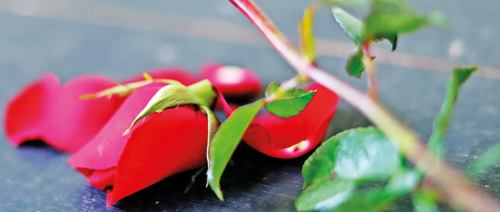
The broken rosebud:Symbol of life unrealised
Pretty 31-year-old Kamala* from Negombo hugs her tiny newborn close, while awaiting discharge from the De Soysa Teaching Hospital for Women in Colombo.
The baby girl born in June has her eyes tightly shut, but lets out a huge yawn once in a while and smiles sweetly.
For Kamala who has a serious heart condition, it has been a major achievement against many odds life has thrown at her. This is her 5th baby.
Married at 24, four of her earlier babies had died during different stages of pregnancy, leaving her heartbroken and her husband distraught, hope and joyous expectation shattered.
She was smiling brightly with her fifth baby in her arms in Ward 3 at the De Soysa Hospital on the same day that in the hospital’s auditorium a young doctor moved by the plight of women who lose their babies launched a programme of care and concern on how to handle mothers who were returning home empty-handed and heavy-hearted.
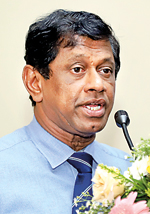
Prof. Athula Kaluarachchi
It is aptly named the ‘Rosebud Service’, as these tiny rosebuds would never blossom into roses, having been nipped in the bud by the hand of death. The doctor who has worked long and hard and got many to join him on his journey to give thought and succour to these hapless women is Senior Lecturer in Obstetrics and Gynaecology Dr. Probhodana Ranaweera. He is attached to the Professorial Unit of the De Soysa Hospital and the Colombo Medical Faculty.
Kamala has been an early beneficiary of the Rosebud Service when it was in its ‘baby-stage’ and had come under its wing after losing her third and fourth babies.
The Rosebud Service was officially launched at a simple ceremony on June 20 amidst a distinguished gathering which included Chief Guest and President of the Sri Lanka College of Obstetricians and Gynaecologists, Prof. Athula Kaluarachchi and the Director of the De Soysa Hospital, Dr. Sagari Kiriwandeniya.
Before detailing what the Rosebud Service is all about, Dr. Ranaweera says how even as a House Officer he was “disturbed and upset” because hospital staff seemed not to know how to handle a stillbirth or as they call it medically an ‘intra-uterine death’ (IUD – death in the womb).
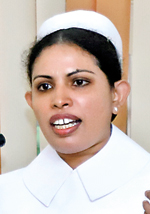
Bereavement Nursing Officer S.A.R. Salwathura
The bereaved mother had to stay in the ward until the delivery of her lifeless baby and dwell whether as our culture deemed, it was due to a “pera pavak” (sins of a previous life). Her very heart would be wrenched as she heard other babies cry.
As she languished in the same ward as mothers who were overjoyed at the birth of their babies, even the doctors and nurses would hurry past her, not look at her, recalls Dr. Ranaweera, adding that they were unable to handle the situation, as in maternity hospitals the norm was that they were dealing with new life and not death. It was not that they did not want to do something for these mothers but that they did not know how.
In 2013, it was time for Dr. Ranaweera to head to the United Kingdom (UK) for training and a surprise awaited him there.
“It amazed me,” he says, explaining that a mother with IUD had a cosy and comfortable room all to herself. It was like a hotel room and her family could be with her. There was a special ‘Bereavement Midwife’ too and a sticker – a wilting rosebud – assigned to the grieving mother. She would not see other mothers or be exposed to the cries of their newborns. The delivery of the dead baby would be in a special room in a closed environment.
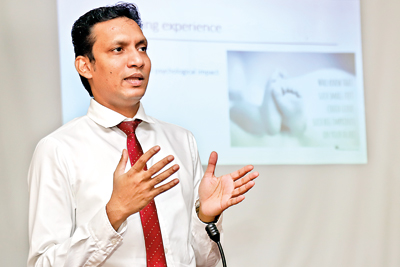
Dr. Probhodana Ranaweera: Moved to help mothers in despair. Pix by Ishanka Sunimal
When Dr. Ranaweera returned in 2015, he set about garnering support from the hospital authorities and initiating a counselling training programme for several nurses. He was also very much in touch with his seniors here, UK teachers and colleagues.
He says that losing a baby before birth is a devastating experience. For parents it causes guilt, an emotional and psychological impact, social stigma and fear. The caregivers, meanwhile, had to break the bad news, deal with the mother’s emotions, be wracked by guilt and disappointment and sometimes face possible litigation.
Comparing and contrasting what used to happen and what happens under the Rosebud Service, Dr. Ranaweera says that in the past once the caregivers broke the tragic news to the mother, she could not go home and return later to the hospital on the date assigned to deliver her lifeless baby. That period would vary from two to seven days.
“Earlier, there were no set plans for the induction of labour and pain relief during labour. Placenta checks and post-mortem examinations were not streamlined and resource limitations compelled the hospital to keep the bereaved mother in the antenatal ward along with mothers who had delivered healthy babies. She was discharged from hospital only after the baby’s burial chit was issued. There was also no future plan for these mothers and most of them never returned to the hospital if or when they became pregnant again. There were no counselling services,” he said.
The Rosebud Service has changed all that, from the moment the news is broken to the mother there would be counselling by a Bereavement Nursing Officer and a prompt medical investigation on why the IUD occurred, it is learnt.
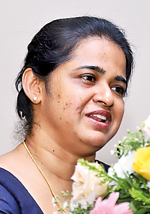
Dr. Sagari Kiriwandeniya
“Then the mother can go home, with both her husband and other close relatives having a chance to be part of the decision-making and grieving process. The Bereavement Nursing Officer would be there for her, available to give ear to her sorrow in hospital and also outside. A day or two later she would return and get re-admitted and be given the ‘Rosebud’ sticker indicating that ‘we have a Rosebud today’,” says Dr. Ranaweera.
The contact person would be one of the Bereavement Nursing Officers S.A.I.N. Subasinghe, S.A.R. Salwathura, A.L.S.C. Kulathunga or D.M.D. Kumari whom she can call to talk to, cry and share her grief. They have been trained in counselling by Senior Counsellor Dr. R.M. Anula Rathnayaka, with all of them going beyond the call of duty, training after working hours and using their personal mobiles. On June 20, however, a dedicated line was donated by George Steuart Company.
There would also be a detailed plan for the bereaved mother on the induction of labour, much empathy during labour, pain management, data collection and follow-up. She also had the option of having a female labour companion by her side during the delivery.
The hospital, meanwhile, would perform the placental pathology and postmortem. The mother could go home without being in hospital until the postmortem is concluded. There is a major change of attitude towards her.
The most important factor will be looking to the future with hope – for another pregnancy if indicated and once she conceives having quick access to the Specialist. The new pregnancy would also be managed in a multi-disciplinary setting.
And so…….those mothers who lose their babies have a strong shoulder to lean on – the De Soysa Hospital and its staff.
Appreciation flows forth from Dr. Ranaweera to all those who paved the way for the Rosebud Service including Dr. Kiriwandeniya; his seniors Prof. Hemantha Senanayake, Prof. Kaluarachchi, Prof. Chandrika Wijeyaratne, Prof. Hemantha Dodampahala and Dr. Kanishka Karunaratne; Pathologists Prof. Chandu De Silva, Dr. A.A. Priyani, Dr. Gayani Ranaweera and Dr. Harshima Wijesinghe; Haematologist Dr. Anoma Weerawardane; and his colleagues Dr. M. Rishard, Dr. Asanka Jayawardana and Dr. Chandana Jayasundara; ward matrons, sisters and nursing staff, the Administrative Officer and Shantha.
His fervent hope is that the ‘Rosebud Service’ would create a ripple effect, spreading not only to all the units at the De Soysa Hospital but to all hospitals across the country. “I hope the Rosebud Service will be part of maternal care nationwide,” adds Dr. Ranaweera.
(* Name changed to protect the mother’s identity)


